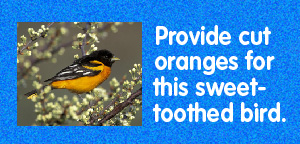This season's articles (Excerpted from our printed newsletter):
The Baltimore Oriole
Even though they're one of the most brilliant songbirds that visit backyards, all North American Orioles belong to the blackbird family. Unlike other members of their family, they spend most of their time high up in the treetops rather than on the ground. The male head, throat, wings, and tail are black with underparts of orange to yellow-orange. The adult female is yellow-brown on the upper parts with darker wings, dull orange on the breast and belly.
 When orioles return to their northern breeding territories they look for tree cover and stay well-hidden in their search for food, primarily spiny caterpillars, insects, and fruits. The females build their incredible woven nests high above the ground. Most oriole nests are true works of art and ingeniously engineered. They're skillfully woven from fibers of grasses, grapevines, and milkweed, and even close up like a drawstring purse when occupied by parent or youngsters. Sound is often the only way to locate their nests, the vocal cries of their young demanding food.
When orioles return to their northern breeding territories they look for tree cover and stay well-hidden in their search for food, primarily spiny caterpillars, insects, and fruits. The females build their incredible woven nests high above the ground. Most oriole nests are true works of art and ingeniously engineered. They're skillfully woven from fibers of grasses, grapevines, and milkweed, and even close up like a drawstring purse when occupied by parent or youngsters. Sound is often the only way to locate their nests, the vocal cries of their young demanding food.
They breed along woodland edges and open areas with scattered trees, especially deciduous trees as in parks or wooded urban areas. They winter in Florida, the Caribbean, central Mexico, and Central America to northern South America.
The males arrive in early May, trumpeting their rich, mellow notes loud, clear, and far-reaching. They search for the perfect territory preparing for the females and fledgling arrivals: Be sure to have your feeders out by the end of April or early May for them.
Orioles have a sweet tooth. Grape jelly and sugar water feeders made for orioles seem to hold their interest throughout the spring and summer seasons, up until it is time to migrate south in early autumn. They also crave citrus, mainly halved or cut oranges. It seems their orange craving wanes a bit about the time they start feeding their youngsters at the nest with caterpillars and insects.
Back to current newsletter













